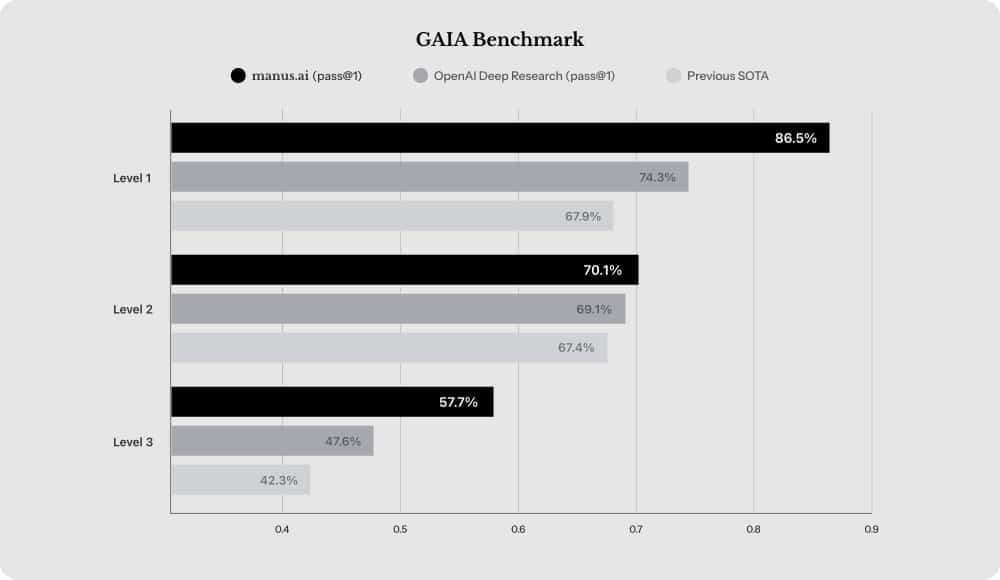Artificial intelligence has undergone rapid evolution in recent years, with OpenAI, Google, and other major tech companies leading the development of advanced language models. However, a new AI from China has entered the scene with the ambition of surpassing even OpenAI: Manus, a general AI agent that not only generates ideas but also executes them.
What is Manus and why is it generating so much hype?
Manus is an autonomous artificial intelligence agent designed to carry out complex tasks from start to finish. Unlike other text generation-based AI models like ChatGPT or Gemini, Manus makes decisions, executes actions, and delivers concrete results. This capability positions it as a more advanced model in process automation, eliminating the need for human intervention in many tasks.
Its official presentation took place on March 6, 2025 through a video on the social media platform X (formerly Twitter), showcasing some of its applications in the real world. In less than 12 hours, the announcement amassed over 200,000 views, making it one of the most discussed launches in the tech community.
Key features of Manus
Manus is not just a chatbot but an AI agent capable of managing specific tasks with advanced planning capabilities. Some of its standout features include:
- Travel planning: It can generate complete and personalized itineraries, booking flights, hotels, and activities based on user preferences.
- Advanced financial analysis: It evaluates market trends, analyzes stocks, and provides visual dashboards for strategic decision-making.
- Supplier research and analysis: It carries out detailed market studies and finds optimized supplier options based on specific needs.
- Business automation: From data management to sales optimization on platforms like Amazon, Manus enhances business performance.
- Educational content generation: It creates video presentations and interactive courses based on complex topics like mathematics, physics, and economics.
- Specialized research: It can produce detailed reports on topics such as the impact of climate change, military history, or industry trends.
In addition, Manus sails the web autonomously, allowing it to collect real-time information, cross-reference data, and optimize its responses based on context.
An AI surrounded by controversy
The launch of Manus was not without controversy. Hours after its presentation, the company’s official account on X was unexpectedly suspended. According to Ji Yichao, the project’s founder, the suspension was unrelated to the company but rather linked to third-party mentions associated with cryptocurrency fraud. Manus has no connection to the crypto world, nor has it issued tokens or participated in blockchain projects.
Another controversial aspect is the exclusivity of the beta. Access to Manus is invitation-only, leading to a black market for access codes. Reports suggest that on some second-hand platforms, codes reach prices of up to 50,000 yuan (approximately $6,890). Some experts believe this strategy is a marketing tactic to generate demand and exclusivity, while others view it as a way to manage server load during its initial phase.

Can Manus really surpass OpenAI?
The claim that Manus can surpass OpenAI has been met with skepticism by many AI experts. OpenAI is an industry leader with models like GPT-4 and GPT-5, used by millions, and with a solid infrastructure. However, Manus proposes a different approach based on autonomous action, which could give it an edge in certain scenarios.
Advantages of Manus over OpenAI
- Greater autonomy: While ChatGPT and similar models require users to make decisions based on their responses, Manus executes complete tasks without human intervention.
- Integration capability: Manus is designed to work with business systems and digital platforms, optimizing processes more effectively.
- Advanced planning and reasoning: It not only answers questions but also organizes information, anticipates needs, and optimizes strategies.
Challenges for Manus
Despite its promises, Manus faces significant challenges:
- Infrastructure and scalability: OpenAI has a cutting-edge network of servers and computing resources, while Manus is still in beta.
- Software development: To be competitive, Manus will need a robust API that is easy to integrate with business systems.
- Security and privacy: An autonomous agent that navigates the web and executes tasks poses risks in terms of privacy and data protection.
Conclusion: A new leader in AI or just a promise?
Manus has burst onto the artificial intelligence scene with an innovative proposition: an AI that not only thinks but also acts. Its promise to surpass OpenAI is ambitious, but if it can meet its goals, it could represent a significant shift in how we interact with technology.
As access to its beta remains exclusive, the tech community is closely watching whether Manus can truly become the new standard in autonomous AI or if it will end up as just another unfulfilled promise.
For now, one thing is certain: China continues to make significant strides in the AI race, and Manus is yet another testament to the fact that global competition will only intensify in the coming years.
Source: Artificial Intelligence News

